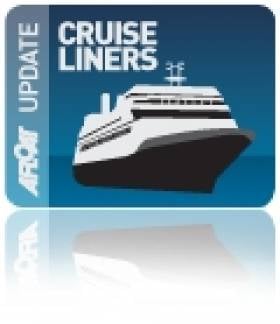Displaying items by tag: Cobh cruise liners list
Queen’s Namesake to Retrace Royal Visit
The 90,901 gross registered tonnes cruise ship is to depart her Hampshire homeport, where she is to similarly follow the monarch in that she is scheduled to make a port of call to Dublin first on 9 September and make a call to Cork afterwards.
With a length of 295m / 965-feet the vessel will dock in the centre of the capital port before she sails overnight to make a morning arrival at Cobh, the dedicated cruise terminal for the Port of Cork. She is scheduled to stay at the Cork Harbour town formerly named Queenstown until a 17.00 hour departure.
Her visit coincides with Cork Harbour Open Day, where visitors can view the impressive vessel from the quayside, for more details visit www.corkharbour.ie
Incidentally her near-sister Queen Victoria also called to Dublin in May and the remaining vessel of the Cunard fleet, the 'flagship' liner Queen Mary 2 is also to dock in Cobh three days later after Queen Elisabeth's visit.
- Cobh
- Cork Harbour
- port of Cork
- Cruise Liners
- Cork Harbour Open Day
- Ports and Shipping
- Cobh Cruise Terminal
- Queen Elizabeth II
- Cork Harbour News
- Port of Cork Company
- Cunard Line
- queen victoria
- Port of Cork News
- Queen Elizabeth
- Queen Mary 2
- QM2
- Cruise Liner news
- TransAtlantic Liners
- Cruise ships
- Irish cruiseship calls
- Queen's visit to Ireland
- QV
- QE
- Cunarders
- Cobh Cunarders
- Cobh cruise calls
- Cunard liners
- Cunard cruiseships
- Royal visit to Ireland
- Cobh cruise liners list
























































